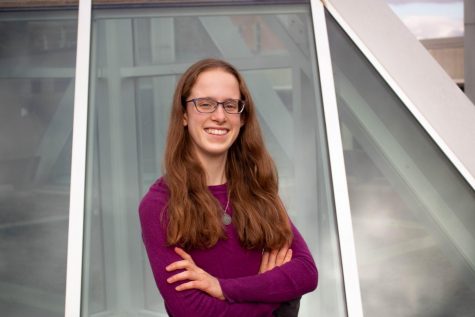UNI students adjust to online classes
Apr 7, 2020
Two weeks into the sudden switch to online-only operations due to the spread of COVID-19, UNI students are adjusting as well as can be expected.
As in-person classes became Zoom meetings or recorded lectures via Panopto, professors and students have had to adjust on the fly. Professors have turned in-class participation points into discussion board posts and group presentations into written papers and reflections.
There are some aspects, though, which can’t be translated to the online environment.
“We can’t do our labs, basically,” said Emily McCalley, a senior biology (pre-dental) and Spanish double major. “[For example], for Anatomy and Physiology 1 and 2, you need to use cadavers and you need to be touching and holding, and they include dissections, and you can’t do those things when you don’t have your hands on them.”
Community engagement projects, too, have become impossible.
“We were supposed to have a lot of volunteer work or some community projects that obviously aren’t happening, which is disappointing,” said senior public health and education major Anna Bandfield. “We were going to work with Embarc and do some after-school [activities] with kids, and obviously we can’t go out and meet with them, so there’s a lot of just making that stuff up in paper work and reflections and stuff like that.”
However, students say that their professors have made the most of the situation and have been willing to work with them.
“I’ve gotten really lucky, and my professors have been super accommodating and flexible with everything,” said sophomore communication major Leah Evans. “I think they definitely understand this is the first time we have to deal with it, and this is the first time they’ve ever had to deal with it. It’s not the best situation, obviously, but the people I’ve been working with the last few weeks have been really flexible and positive.”
Some professors are even finding ways to introduce the worldwide crisis into their syllabi. Evans described how her public speaking professor has rearranged their course units to spend more time talking about crisis communication, and Bandfield noted that the public health implications of COVID-19 have come up in class discussions. McCalley said her professors are using the pandemic as part of their replacement activities for labs.
“Instead of doing labs, we are going to be diving deeper into more lectures instead, and then we may be potentially looking at different experiments that have been done with the coronavirus or other viruses, writing our own lab reports on them based on what they’re doing,” she said.
But no matter how innovative the replacement activities are, students agreed they can’t compare to in-person classroom experiences.
“Especially since it’s my senior year, this is the first year I’ve really gotten close with the people in my major and enjoyed going to class and seeing everyone and sharing this experience, so that’s disappointing that we don’t get to meet anymore,” Bandfield said.
McCalley, who will be applying for dental school in the next few months, worries the abrupt changes will have ramifications for her later education. She also noted that UNI’s decision to extend the deadline for students to switch from “credit” to “no credit” grading doesn’t apply to pre-professional students, who can’t take courses as pass/fail since grades are so important to medical and dental schools.
“It’s pretty scary,” McCalley said. “This isn’t how you want to spend your last semester, the one you probably want to do best in. I’m pretty worried how my compromised learning is going to affect my grades which will affect my education.”
Evans and Bandfield agreed that for a class that’s designed to be held in person, online learning is an abrupt learning curve.
“I know personally I focus way better and can get more done when I’m on campus,” Bandfield said. “It just doesn’t feel official enough to really be classes and work when I’m just sitting at home.”
It’s a learning curve that’s extended to every aspect of their lives— and the lives of students and citizens worldwide.
“TThere’s still so many uncertainties right now,” Bandfield said. “There’s [the] loss of jobs and security. I had a lot of future plans that are either on hold or canceled altogether, [so] it’s kind of trying to rebuild and figure out what there is to look forward to.”
“You have all these milestones of what you think should be happening in the year, but none of those happened, and now it’s just filled with abnormalities and uncertainties,” McCalley said. “Do I have a job lined up? What am I going to do? What comes next? It’s just a lot of ‘Well, now what?’ Planning in advance has just been thrown out the window.”














